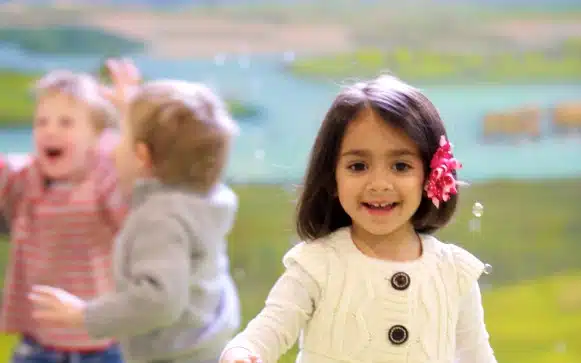The chill in the air and bustle of September has turned our minds at Bubbles Academy to school readiness. We love helping families with tips on preparing for preschool. Last week families listened to Jane Nolan, director of Park West Cooperative Nursery School. Jane’s talk was part of the Neighborhood Parents Network’s Chicago School Choice Series.
Jane’s dynamic talk got me thinking about how improvisation relates to school readiness. Even more reasons children benefit from improv training can be found on the The Second City Network.
Before she even spoke, I had a feeling I was going to really like Jane. Wearing a gray, chevron dress, chunky wedge sandals and a funky headband, she looked ready for fun on this rainy evening. As she spoke, I knew I wanted to play with her. Not just in the classroom, or out on a ball field … but on stage. Just from hearing her approach to inspiring confidence in children as they begin nursery school and observing her interactions with parents at the event, I could tell that Jane was a natural improviser.
Or was she just exhibiting traits of a skilled educator? Or maybe the two go hand in hand? Jane’s presentation inspired me to share a few thoughts about school readiness and preparing for preschool that just so happen to be essential to improvisational theatre:
Create a Safe Space
Before a child is able to experience learning outside the home, they must feel comfortable and secure. A child must feel safe before they’re able to take the risks necessary to try new things, explore and create relationships. Jane shared that children need to know that you, their parent, feels confident about the school and that they will be well-taken-care-of there. As Jane shares in this letter on separation:
“The separation process is really about the child and parent’s ability to feel that school is a safe place to be.”
Similarly, when preparing to improvise with a new group, teaching students who are new to improv, or even getting ready to perform with your veteran group, it’s important to lay the groundwork that you are in a safe space, where all ideas are respected and supported. Players are assured that their team is there to support them and make their ideas look good, even though they don’t know where they might lead.
Expand your Comfort Zone
Jane noted the important distinction between recognizing the difference between displeasure and distress in your child. They may express some anxiety or displeasure at being separated from you and home — their comfort — as they venture to school for the first time. If your child has difficulty transitioning to the classroom, help them ease separation in preparing for preschool. Anytime we push our comfort zone or stretch new muscles, parents and children alike may cry out as discomfort arises.
However, displeasure differs from true distress. If a child expresses lingering distress over a parent’s absence, the child might not be ready to experience separation. He or she might benefit from taking more time to develop. School readiness is a process and can differ for each family.
Every time an improviser gets up on the stage to perform a new scene or try a new exercise in class, they push their comfort zone, which can sometimes feel unpleasurable. But the pay-off of experiencing initial discomfort during improv can be very rewarding, just as in learning to function independently of our parents. This occurs when players learn to trust their partners and create together. Expanding your comfort zone is an important life skill at any age.
Culture of Listening
As Jane’s talk shifted into question & answer mode, I noticed that she practiced what she preaches by listening to others. By noticing each parent’s tone, body language, and by hearing their specific questions, she gave personalized and thoughtful replies. The parents and teachers stayed in rapt attention. This is emblematic of Park West’s teaching pedagogy. Actively listening to and observing your child helps to build essential trust and validates the importance of their ideas and thoughts. From Park West’s website:
“Teachers need to be active listeners of the ideas of children in order to know what children are thinking about, what ideas they are curious about and working to puzzle through.”
Likewise, listening is at the heart of all successful improvisation. Improvisers make magic when they respond to each other in the moment. Each word your scene partner utters is a gift that can turn into the next bold adventure or into a truly intimate relationship leading to discoveries made within each moment of the scene.
This comparison between effective school readiness strategies and improvisation techniques makes me wonder …
What would happen if we all listened to our children that closely and saw each phrase as a gift to accept and build upon — and taught them to do the same? What if all schools were safe havens where children could relax, play and feel comfortable enough to become uncomfortable and take creative risks? Where their thoughts and ideas are respected?
And because of their openness, they often hear the words: I want to play with you!

Natalie Monterastelli
Natalie Monterastelli is the Executive Director of Bubbles Academy and founder of Class Act, interactive education and events. She has a Master’s degree in Educational Theatre from NYU and first experienced the positive effects of improv in the classroom while working with Freestyle Repertory Theatre in New York City.
Share comments or questions with Natalie about arts and early childhood education. Follow on Twitter — @MonterastEllis
